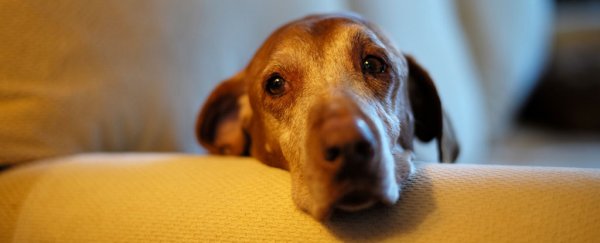The domestication of dogs over the course of several thousand years has inadvertently led to them carrying harmful genetic baggage, a new study has found.
According to researchers at the University of California, Los Angeles (UCLA), a combination of practises carried out by humans to select for desirable traits in domestic dogs has resulted in them possessing an excess of deleterious DNA today.
"Dogs have an integral role in human society, and recent evidence suggests they have a unique bond that elicits a beneficial hormonal response in both dogs and human handlers," the authors write. "Here, we show this relationship has a dark side."
The separation of dogs from their grey wolf ancestors started more than 15,000 years ago, and that's where the problems began, the researchers say. Severe population 'bottlenecking', where not enough grey wolves contributed to the starter population, meant the genetic diversity of early dogs was not as wide as it should have been.
This problem has been compounded over time by the artificial selection of dogs for selective breeding purposes – where breeders pick animals for mating based on certain physical or temperamental traits.
While this has resulted in the creation of the distinct and much-loved dog breeds we know today, it's also saddled the animals with harmful mutations in the process that get passed along with the desired characteristics.
The negative genetic repercussions of this – which are more pronounced than the recent effects of inbreeding – can lead to breeds having increased susceptibility to particular diseases.
To assess the health of today's dogs, the researchers analysed the complete genome sequences of 46 domesticated dogs from 34 breeds. They contrasted this with sequences of wolves and village dogs (animals descended from indigenous dogs) in what they claim represents the largest survey of dog genetic diversity based on genome sequences to date.
Their findings, reported in PNAS, describe how dogs for the most part possess more harmful gene variants than wolves, and which increase in frequency in dogs bred for positively selected traits.
"Small population size during domestication and strong artificial selection for breed-defining traits has unintentionally increased the numbers of deleterious genetic variants," the researchers write. "Our findings question the overly typological practice of breeding individuals that best fit breed standards, a Victorian legacy. This practise does not allow selection to remove potentially deleterious variation associated with genes responsible for breed-specific traits."
The researchers say their findings may have important implications for selective breeding programs, highlighting the genetic costs associated with the human favouring of select breed traits.
"Our results also suggest that maintaining a large population size, rather than just avoiding inbreeding, is a critical factor for preventing the accumulation of deleterious variants," the researchers conclude.
